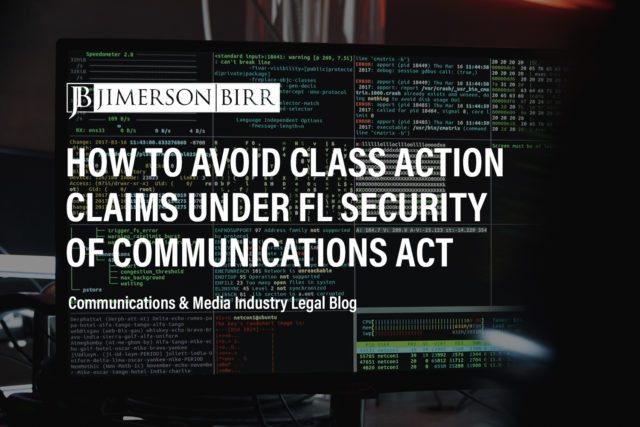How does media subpoena defense affect communications and media companies?
Media subpoena defense plays a crucial role in safeguarding the rights and interests of communications and media companies in Florida. It involves the legal strategies and actions taken to protect sensitive information, journalistic sources, and editorial integrity when faced with subpoenas seeking disclosure of confidential materials or compelling testimony from journalists or media personnel.
For Florida-based businesses operating in the communications and media sector, media subpoena defense is essential for preserving the freedom of the press, maintaining trust with sources and audiences, and upholding ethical standards of journalism. By effectively defending against subpoenas, media companies can avoid undue interference in their newsgathering and reporting activities, thereby preserving their independence and credibility.
Through robust media subpoena defense, Florida-based communications and media companies can navigate legal challenges while fulfilling their vital role as watchdogs of society, holding power to account, and informing the public about matters of importance. By protecting the confidentiality of sources and confidential information, media subpoena defense enables journalists to pursue investigative reporting and cover sensitive issues without fear of retribution or legal repercussions.
Need help regarding media subpoena defense? Schedule your consultation today with a top communications and media attorney.
In Florida, which laws and regulations apply to media subpoena defense?
- Shield Laws: Florida has enacted shield laws that protect journalists from being compelled to disclose confidential sources or unpublished materials in certain circumstances. These laws recognize the importance of preserving the confidentiality of journalistic sources and information to promote a free and independent press.
- First Amendment Protections: The First Amendment to the United States Constitution provides broad protections for freedom of speech and the press, which form the basis for many media subpoena defense arguments in Florida courts. These protections encompass the right to gather and disseminate news without undue government interference.
What are common issues regarding media subpoena defense that lead to litigation?
The following issues are among the most common in actions regarding media subpoena defense:
- Failure to Preserve Evidence: Inadequate preservation of relevant documents or communications can lead to accusations of spoliation of evidence, resulting in litigation over the authenticity and completeness of the information provided.
- Challenges to Journalistic Privilege: Media companies may face legal challenges to journalistic privilege, especially concerning the protection of confidential sources or unpublished materials, leading to litigation to uphold these privileges.
- Overbroad Subpoenas: Issuance of overbroad subpoenas seeking irrelevant or privileged information can prompt objections and legal disputes, potentially escalating into litigation over the scope and validity of the subpoenas.
- Conflicts with Confidentiality Agreements: Media subpoena defense may involve conflicts with confidentiality agreements or contractual obligations, triggering litigation to reconcile legal obligations with contractual commitments.
- Interference with Newsgathering Activities: Attempts to compel journalists to testify or disclose information can impede newsgathering activities, prompting litigation to safeguard press freedoms and editorial independence.
We are value-based attorneys at Jimerson Birr, which means we look at each action with our clients from the point of view of costs and benefits while reducing liability. Then, based on our client’s objectives, we chart a path to seek appropriate remedies.
To determine whether your unique situation may necessitate litigation, please contact our office to set up your initial consultation.
What steps should businesses take to minimize the risk of litigation over media subpoena defense?
- Develop Comprehensive Policies: Establish clear policies and procedures for responding to subpoenas, including protocols for preserving evidence, evaluating requests, and asserting legal privileges.
- Train Personnel: Provide training to employees on media subpoena defense protocols, confidentiality requirements, and legal obligations, ensuring awareness of compliance measures and best practices.
- Engage Legal Counsel: Seek guidance from experienced legal counsel specializing in media law to assess subpoena requests, navigate legal challenges, and formulate effective defense strategies.
- Document Compliance Efforts: Maintain detailed records of subpoena responses, communications with legal counsel, and compliance efforts, demonstrating diligence and good faith in addressing legal obligations.
- Review Contracts: Conduct periodic reviews of contracts and agreements to identify potential conflicts with subpoena obligations and proactively address any discrepancies or ambiguities.
- Stay Informed: Stay abreast of developments in media law, including legislative changes, court rulings, and industry standards, to adapt strategies and practices accordingly.
Frequently Asked Questions
Can a media company refuse to comply with a subpoena?
Yes, a media company can refuse to comply with a subpoena if it conflicts with legal privileges, such as journalistic privilege or constitutional protections.
What should a business do if served with a subpoena?
Upon receiving a subpoena, a business should promptly notify legal counsel, preserve relevant evidence, and assess the subpoena’s scope and validity to determine the appropriate response.
What are the potential consequences of failing to comply with a subpoena?
Failure to comply with a subpoena can result in legal penalties, including fines, sanctions, or contempt charges, highlighting the importance of proactive compliance measures and legal guidance.
Have more questions about a media subpoena defense-related situation?
Crucially, this overview of media subpoena defense does not begin to cover all the laws implicated by this issue or the factors that may compel the application of such laws. Every case is unique, and the laws can produce different outcomes depending on the individual circumstances.
Jimerson Birr attorneys guide our clients to help make informed decisions while ensuring their rights are respected and protected. Our lawyers are highly trained and experienced in the nuances of the law, so they can accurately interpret statutes and case law and holistically prepare individuals or companies for their legal endeavors. Through this intense personal investment and advocacy, our lawyers will help resolve the issue’s complicated legal problems efficiently and effectively.
Having a Jimerson Birr attorney on your side means securing a team of seasoned, multi-dimensional, cross-functional legal professionals. Whether it is a transaction, an operational issue, a regulatory challenge, or a contested legal predicament that may require court intervention, we remain tireless advocates at every step. Being a value-added law firm means putting the client at the forefront of everything we do. We use our experience to help our clients navigate even the most complex problems and come out the other side triumphant.
If you want to understand your case, the merits of your claim or defense, potential monetary awards, or the amount of exposure you face, you should speak with a qualified Jimerson Birr lawyer. Our experienced team of attorneys is here to help. Call Jimerson Birr at (904) 389-0050 or use the contact form to schedule a consultation.

We live by our 7 Superior Service Commitments
- Conferring Client-Defined Value
- Efficient and Cost-Effective
- Accessibility
- Delivering an Experience While Delivering Results
- Meaningful and Enduring Partnership
- Exceptional Communication Based Upon Listening
- Accountability to Goals











